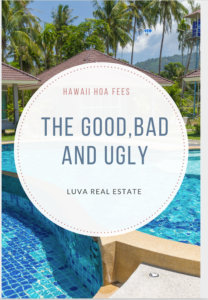 Homeowners Association (HOA) fees are generally looked upon as a financial headache when purchasing a condo or homes within certain neighborhoods in West Hawaii. However, residents and tenants forget that when the pool stays clean, the landscaping stays vibrant and someone is providing security for them, that those fees are paid for by HOA dues. In light of a few comments LUVA Real Estate has heard from would be homebuyers on the mainland wondering why West Hawaii has “expensive” HOA fees, let’s cover a few of the basics.
Homeowners Association (HOA) fees are generally looked upon as a financial headache when purchasing a condo or homes within certain neighborhoods in West Hawaii. However, residents and tenants forget that when the pool stays clean, the landscaping stays vibrant and someone is providing security for them, that those fees are paid for by HOA dues. In light of a few comments LUVA Real Estate has heard from would be homebuyers on the mainland wondering why West Hawaii has “expensive” HOA fees, let’s cover a few of the basics.
Here are the expenses that are included in most condo/neighborhood HOA fees:
Flood, fire, liability and natural disaster Insurance
- Landscape Maintenance
- Pool Maintenance
- Roof and Exterior Repair/Replacement Substructure
- Plumbing/electrical
- Property Management/Security
- Garbage/Recyling
- Pest Management
- Cable (sometimes)
Yuki Laliberte, co-owner of LUVA Real Estate says, “When I get asked about high HOA fees, I always give the buyers some perspective. A cleaning person in West Hawaii charges $35-$50/hour. To clean a pool is $300 a month for a service. Without the HOA, if you were responsible for hiring a landscape and pool maintenance person, a painter, etc. you would be paying at least $30-50 per hour PER service person. It seems like a lot, but having a single family home, you will have many of these expenses.”
The Good
Consider HOA fees as a forced savings account for a rainy day when aging plumbing and roofing has to be fixed or replaced. If you own a home, are you putting money aside each month to pay for the eventual replacement of your roof or taking down a damaged tree or if suddenly, you are plagued with an insect infestation? Here in Hawaii, all of that can happen due to our tropical weather, humidity and life on an island. The HOA dues handle all the maintence issues for you and you can sleep easy knowing it is all being managed and paid for.
The Bad
What happens when your Board of Directors of your condo association mismanages the long term budget for issues in the future? Or one or two or six fellow owners in your association decide to foreclose? Or a disgruntled owner sues the HOA because they think they should be able to manage the landscaping in front of their unit or they are tired of replacing windows which get broken each year from high surf and think the HOA should pay? All the owners are then responsible for paying more each month to cover the losses or lawsuits.
The Ugly
If you are retired and find yourself on a fixed income, you never “pay off your home” if you purchased a home in a HOA. This may make paying annual increasing dues difficult. HOA’s are at the mercy of our local electrical grid provider, water department, flood insurance providers, labor market, etc. With aging infrastructure, increasing employment costs and insurance premiums, rising ocean levels, and electricity costs (how do you think we get our water pumped to us?) the chance of your HOA fees going up each year are almost certain.
What can you do?
Talk to your Realtor and mortgage professional about the true cost of homeownership and look ahead financially. When considering a property, ask questions and do your homework. Check the Board minutes and financial reports of any HOA that you may be considering joining. Are they in the red or black? How have they handled the major repairs, are there special assessments and how frequent do they happen? Checking the financials will give you a VERY good lens into the health of an HOA and provide possible warning signs, as well. You should also find out how often fees have increased over time, and by how much.
If you can, obtain a printed history of HOA dues by year for the past 10 years. Fees for an HOA are typically increased no more than annually. HOA increases are customarily mapped out three to five years in advance, using estimates of the future costs of utilities, labor, maintenance, and more. Examine these projections if they’re available. Since they’re only estimates, you may also wish to check the amount by which fees are permitted to increase every year under the HOA’s bylaws.
LUVA Real Estate agents can help you obtain records of HOA’s, but many times, you have to be in escrow in order to get access to the documents. Making sure you are working with a locally knowledgable Realtor is key, as they most likely are privvy to knowledge about the HOA property management companies, board politics, recent assessments, etc. If you decide HOA fees are not for you, LUVA Real Estate agents can utilize local knowledge about what it will cost to maintain a single family home and can provide recommendations for great local service providers.